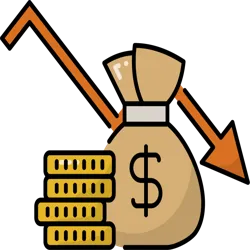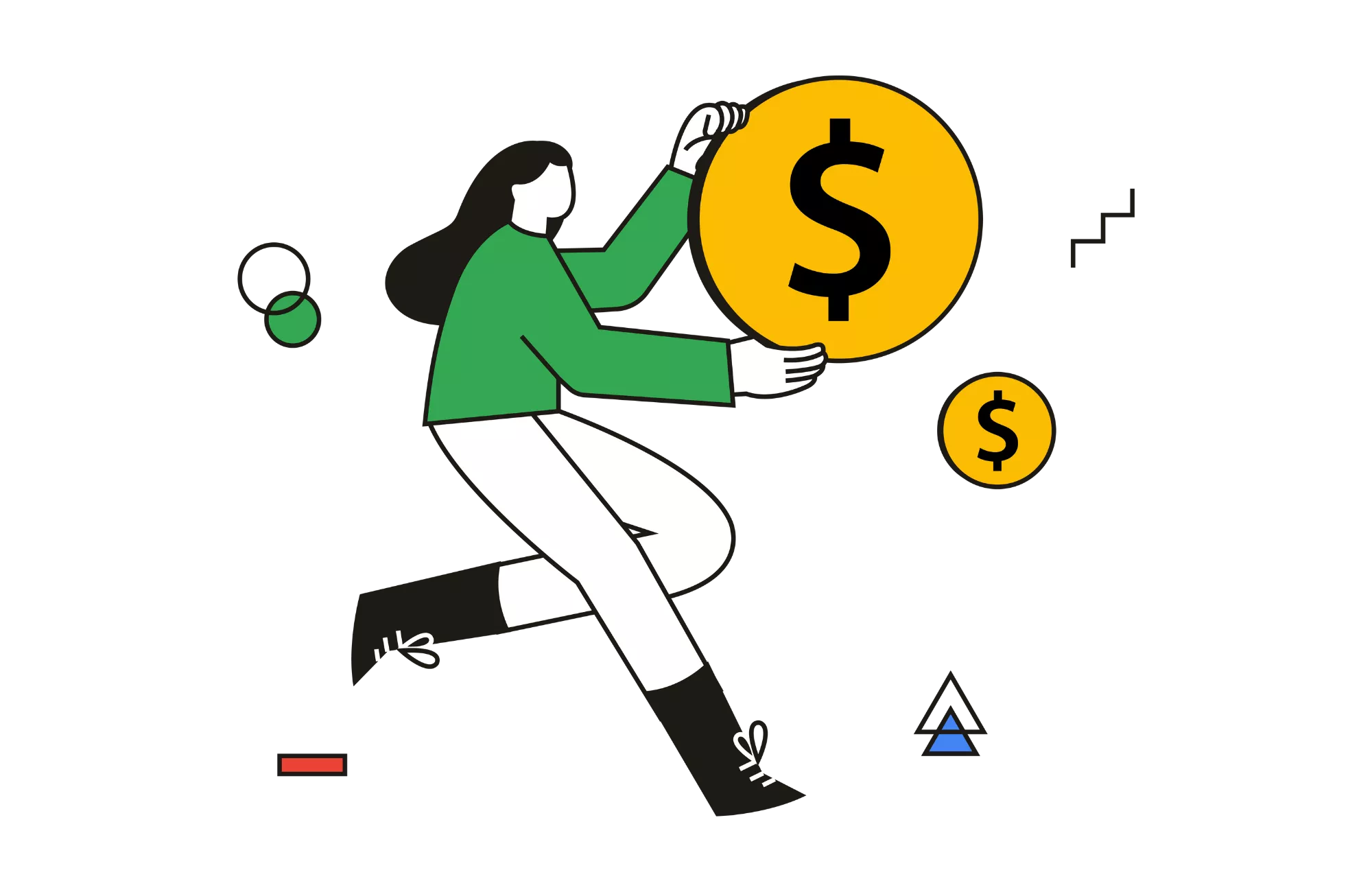With many analysts predicting an economic recession in the near future, the idea of a recession-proof business model may have piqued your interest. The general understanding is that two consecutive quarters of negative growth in an economy constitute a recession—and that negative growth can utterly decimate once successful businesses. However, some businesses are considered “recession-proof” because they typically withstand the impact of recessionary economic conditions.
In this guide, we’re exploring the concept of recession-proof businesses, where you’ll find a list of the top ten recession-proof business ideas. The best way to prepare for a recession is by understanding the specific elements of businesses that survive tough economic times. If you’re instead considering launching your own business, the following ideas are an excellent place to start. They’re businesses built to survive economic contraction, but thrive during economic expansion!
What Is a Recession-Proof Business?

One economic condition marking a recession includes consumer demand decline, creating cash crunches for businesses that may result in bankruptcies and other financial issues. However, a recession-proof business is an operation particularly suited to endure the challenges of a recession.
Even when the economy struggles, recession-proof businesses typically fall within specific industries not prone to experience considerable downturns.
Note: The economic conditions associated with a recession differ from those associated with a depression. To understand the differences between these economic events, check out our recession vs. depression explainer.
Top 10 Recession-Proof Business Ideas and Industries
To be clear, all businesses may be vulnerable to financial peril during a recession. By running your business efficiently and responsibly during periods of even the most favorable economic conditions, you’ll be better prepared for a recession. Below are ten industries that can sustain the challenges of a recession—though businesses within these industries should still be expertly managed to most effectively defend against recessionary impact.
1. Healthcare
For better or for worse, health needs do not wait for a recession to end. As such, the healthcare sector is uniquely positioned to withstand recessionary conditions. Healthcare is often one of the first industries cited for its recession-resistant characteristics, and for good reason. Recent research suggests for every 10% increase in overall unemployment, healthcare unemployment only increases by 1.27%.[1]UIC School of Public Health. “Study finds healthcare sector largely immune to economic downswing“. Accessed October 4, 2022.
Employment figures are an indicator of how well an industry is performing. If the healthcare industry doesn’t need to reduce staff at the same rate as other industries, evidence suggests the health sector outperforms other sectors during economic struggles.
However, while healthcare performed exceptionally well during the Great Recession, this doesn’t guarantee the same will ring true in a new economic downturn. In 2007, many patients had comprehensive healthcare coverage. With the insurance landscape now very different, many insurance holders are burdened with high deductibles exposing them to exorbitant costs.[2]The New England Journal of Medicine. “Are US Hospitals Still “Recession-proof”?“. Accessed October 4, 2022. Patients may now think twice before seeking medical treatment.
While there’s no doubt the occurrence of some medical services may decrease during a recession—such as cosmetic procedures and other elective treatments—healthcare is a historically recession-proof industry.
2. Grocery, Food, and Beverages
People will always need to eat, meaning the food, grocery, and beverage industry is very recession-resistant. However, not all businesses in this space perform well during recessions. Restaurants are notorious for suffering during economic downturns. In 2009, during the Great Recession, restaurant earnings as a whole were “dismal.”[3]New York Times. “The Tables Turn“. Accessed October 4, 2022.
Consumers might forgo expensive dining experiences during a recession and instead, opt for eating from home. This can benefit businesses providing groceries or cheaper food options. Businesses that provide affordable food typically thrive during a recession.
3. Courier, Freight, and Logistics
Businesses within the courier, freight, and logistics companies now benefit from access to extensive data that helps them strategically adapt services to market demands.[4]The Motley Fool. “Why Package Delivery Stocks Will Thrive During a Recession“. Accessed October 4, 2022. With eCommerce positioning itself at the forefront of the economy, the freight industry is essentially the backbone of the economy. That remains true even if retail sales flounder during a recession.
Because the delivery of packages cannot be outsourced to cheaper labor markets, courier and freight services require a domestic presence. If you want to launch a business supporting local economic activity, it’s hard to find a better option than a courier or freight service.
4. Real Estate and Property Management
While the Great Recession occurred due to a property market crisis, not all recessions have had the same impact on home values. The Dot-Com Recession (2000) and the Gulf War Recession (1991) had barely any impact on the housing market.[5]The Balance. “How Recessions Affect Housing Prices in the US“. Accessed October 4, 2022.
In many cases, central banks lower interest rates during recessions, which makes capital cheaper and encourages investment. The availability of more affordable mortgages can positively impact the housing market, as increased financing accessibility can expand the pool of potential home buyers.
5. Contractor, Repair, and Automotive

During recessions, industries that can be easily automated or outsourced often suffer. On the other hand, sectors requiring local labor typically perform well. Because contracting, repair, and automotive industries require skilled, local labor, they are well-suited to withstand economic contraction.
Likewise, consumers need access to contractors, mechanics, and other repair professionals. If your car doesn’t work, you can’t get to work. Access to a skilled, local mechanic is a necessity.
However, not all industries associated with contracting perform well during recessions. Construction spending in the United States contracted by more than 5% in 2008 during the Great Recession.[6]NBC News. “Construction spending drops by record in 2008“. Accessed October 4, 2022. While consumers always need repair professionals, they may hold off on building new properties during recessions.
6. Academic and Education
Evidence suggests education is a recession-proof industry despite its high expense in the United States. When a portion of the workforce is laid off—which so often occurs during a recession—many individuals return to school to develop their professional skills, creating a demand for post-graduate degrees.
During the Great Recession, universities in the United States saw considerable increases in enrollment. Between 2007 and 2010, there was an almost 16% increase in the number of students enrolling in college.[7]The Hechinger Report. “How the last recession affected higher education. Will history repeat?“. Accessed October 4, 2022. While other industries suffered immensely, academia experienced a notable increase in students.
The recession-proof nature of this industry may be due to the federal student loan program. While this places a significant and long-term financial burden on the student, it makes a pathway to education accessible.
7. Accounting and Finance
Accounting and finance may not be industries one immediately associates with the term “recession-proof,” but people still require accounting solutions during most economic downturns, be it tax preparation, estate preparation, or bookkeeping services. Additionally, many consumers and businesses need access to finance. Whether credit cards, car loans, business loans, or other types of lending, the need for these financial products does not disappear during a recession.
However, some finance companies can be at risk during a recession. Finance companies willing to take significant risks are easily exposed to the stresses of an economic downturn. For example, Bear Sterns, one of the United States’ most well-known banks, collapsed during the Great Recession in 2008.[8]History Channel. “Bear Stearns collapses, sold to J.P. Morgan Chase“. Accessed October 4, 2022.
8. Information Technology and Software
During a recession, many businesses find they cannot survive under their existing operational structure. When economic conditions are favorable, businesses may not prioritize investing in technology and automation. Then, when the economy contracts, many successful enterprises improve their automation and technology capabilities to cut down on unwanted costs. This trend benefits IT and software businesses. Businesses that modernize how businesses communicate, store information, and operate typically survive a recession by helping other businesses survive a recession.
This isn’t to say the technology industry is immune from an economic downturn. As seen during the Dot-Com Bubble, the tech industry can fall prey to bubbles resulting in huge asset price reductions.
9. Digital Marketing Services
Spending on digital marketing is predicted to exceed $600b in 2022.[9]Statista. “Digital advertising spending worldwide from 2021 to 2026“. Accessed October 4, 2022. While you may assume businesses cut down on advertising during recessions, digital marketing is a cost-effective alternative to traditional marketing channels. With pay-per-click campaigns, social media marketing, and search engine optimization (SEO), digital marketing services help businesses target specific market segments with an interest in their products.
Also, digital marketing businesses can operate with lower overhead costs—adding to their recession-proof nature. Many business owners find one of their largest business expenses is the cost of labor. However, digital marketing businesses can reap the benefits of the growing gig economy. By hiring web designers, copywriters, SEO managers, and other staff on a contract basis, you can pay employees on a per-project basis.
10. eCommerce and Dropshipping
While retail is known for suffering during times of economic contraction, eCommerce and dropshipping allow you to operate a retail business without the financial overhead associated with normal brick-and-mortar trading.
Retail businesses typically have large overheads—rent commitments, stock storage, and full-time staff members—the costs of which can cause significant financial pressure when consumer demand drops. On the other hand, eCommerce businesses can operate a leaner business model. With minimal financial commitments to constrain them during economic downturns, eCommerce businesses are considered recession-proof, despite the risk of faltering consumer demand.
For a list of ideas on what products you should sell for your eCommerce business, check out our breakdown of the best product ideas for 2025.
10 Other Industries That Do Well in a Recession
While the above recession-proof business ideas are a good starting point whether you want to start a new enterprise or simply understand what constitutes a recession-proof business, other industries also perform well during recessions. Consider the following ten ideas as honorable mentions in the recession-proof industries contest!
1. Freelancing
Taking your skills to the freelance market can make your business much more agile. By partnering with multiple income sources simultaneously, you reduce your exposure to a single business’s performance. However, it’s worth noting that freelancers do sometimes suffer during downturns in the economy. As contract workers, freelancers don’t have the same employment protections as full-time employees.
2. The funeral industry
Sadly, families require funeral services, regardless of the state of the economy. Due to demand, businesses providing support to families suffering from a loss are typically recession-proof.
3. Telecommunications
Telecommunications is another industry usually performing well during economic downturns due to little fluctuation in demand. Whether via broadband, phone networks, or any other telecommunication channels, individuals still need to communicate, socially and professionally, despite poor economic conditions.
However, telecommunications is not an easy industry to enter. Many telecommunications providers are well established and have extensive “network effects.”
4. Pet care
Pet care is known to withstand the pressures of an economic downturn. People love their pets and as a result, they spend more on pet care when the economy’s output decreases. With continued high demand, pet care is a recession-resistant business.
5. Government services
The United States government is not known for reducing its workforce during economic struggles. Additionally, the government may increase spending during a recession to stimulate the economy and foster growth. Aligning your business with government spending can help prepare it for periods of unfavorable economic conditions.
6. Beauty salons
Despite being associated with luxury, the beauty industry is seemingly recession-proof. In fact, during the Great Recession, the number of beauty salons in the nation continued to grow by more than 14%.[10]NewsWeek. “Why a Hair Salon is a Recession-Proof Business“. Accessed December 1, 2023.
The reality is people still want to look good, and some beauty treatments cannot be executed without the help of skilled staff. Also, this is not a service you can outsource to another country, meaning consumers need access to in-person beauty professionals.
7. Childcare
Childcare is an expenditure many families can’t afford to cut. Whether it’s babysitting, daycare, or any other childcare service, it’s a basic necessity for many American families, especially for households in which both parents work full-time jobs. Because this is another service individuals cannot outsource to places with cheaper labor forces, there will always be a need for local childcare.
8. Tattoo parlors
The tattoo industry seems to perform well during modern recessions. Though, this might be because tattoo popularity is increasing in the United States.[11]Ipsos. “More Americans Have Tattoos Today than Seven Years Ago“. Accessed October 4, 2022. Additionally, skilled tattoo artists are highly sought-after individuals. And again, you can’t outsource it!
9. Staffing and employment agencies
Because recessions can result in higher unemployment rates, businesses may require short-term staff and other employment solutions. Enterprises matching businesses with skilled employees can help businesses weather a recession, all while weathering a recession themselves.
10. Cleaning businesses
While cleaning businesses do have exposure to recessionary pressures, certain cleaning business models are well-suited to endure economic contraction. For example, cleaning businesses servicing commercial clients operating in recession-proof industries experience reduced exposure to a recession. However, cleaning businesses servicing a base needing to cut costs during a recession may suffer when the economy experiences a contraction.
Final Thoughts on Recession & Pandemic Proof Businesses
Keep in mind each recession brings with it different economic conditions, meaning it’s difficult to predict how the next recession will impact specific industries. However, most “recession-proof” businesses do not experience much fluctuation in consumer demand or operate with low overhead costs. By understanding the commonalities across recession-proof business models, you can incorporate such practices into your existing business or ensure these elements are built into your new business venture.
For people looking to start a new business or business owners unsure of how to lower overhead costs in preparation for a recession, consider consulting with a merchant services provider that can help you get the lowest credit card processing rates. A merchant services provider can not only help you prepare for a recession, but also survive a recession. During a recession, PaymentCloud can help you defend against an unpredictable economy!
FAQs About Recession-Proof Business
Which industry was hardest hit by the recession?
Because each recession brings with it unique economic characteristics, the exact answer depends on the recession. That said, retail is an industry that often suffers during market contractions. As consumers tighten their budgets, non-essential retail can take a significant hit.
What are some of the signs of an official recession?
While most analysts define a recession as two consecutive quarters of negative growth, other indicators can point to a recession. These include a reduction in GDP, fewer retail sales, higher unemployment, and slowdowns in manufacturing.
How can you support your business in a recession?
The best strategy for protecting your business depends on the type of recession, your industry, and a host of other factors. Traditionally, many entrepreneurs assess their current business expenses to identify areas where they can save money. Many businesses may take the initiative to invest in technology to help automate processes and reduce waste. Likewise, businesses may search for more affordable materials and suppliers. Assessing variable costs can help you save significant money and emerge from a recession even stronger.
Why do some industries do better during a recession than others?
When recessions occur, unemployment can increase, lowering consumer demand. Some industries have more exposure to recessions because they are considered less “essential,” meaning they are the first types of goods or services consumers cut from their budget.
Are there any businesses that are not recession-proof?
Yes. All types of businesses can be “not recession-proof.” If your business does not have cash reserves or a strong business plan, it can suffer during a recession. However, specific industries survive better than others in recessions.
Is a recession a good time to start a business?
Starting a business during a recession can be difficult. As consumer confidence is often at all-time lows during recessionary periods, it can be challenging to build a customer base at this time. Whether or not starting a business in a recession is a good idea largely depends on your industry, resources, and other economic factors.
How do you create a recession-resistant business?
Creating a recession-resistant business is no easy feat. However, by choosing a resistant-proof industry, keeping your business’s finances in order, and sticking to a reliable business plan, you can improve your chances of surviving the next recession.





